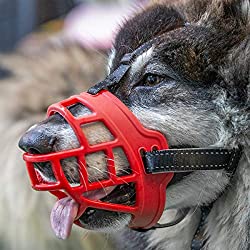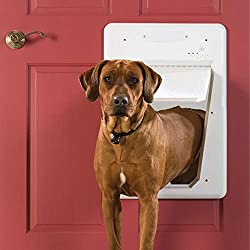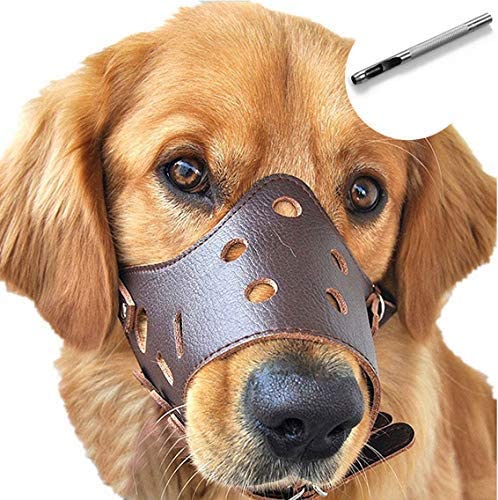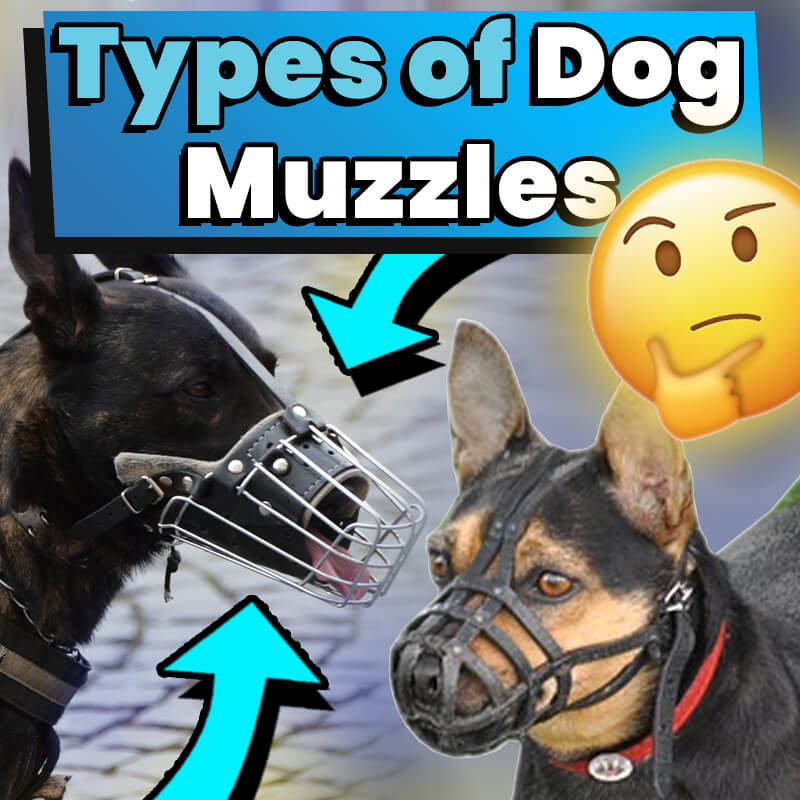
Do Muzzles stop dogs from barking? Yes, dog Muzzles can temporarily discourage dogs from barking and keep them calmer. However, restricting a dog’s natural behavior to bark by wearing a Muzzle could lead to stress or anxiety so it shouldn’t be used as a long-term solution. You’ll want to use behavioral training or noise desensitization to address excessive barking. If you do choose the Muzzle options, select a No Bark Muzzle that allows your dog to pant freely, breathe easily, and prevent biting or eating inedible objects.
Navigating the intricate world of canine behavior can be challenging, especially when your furry friend’s loud barking becomes a regular occurrence. It’s completely natural to search for practical solutions that strike a balance between understanding your pet’s needs and maintaining a peaceful home environment.
Among the various methods owners consider, one question often emerges: the use of Muzzles. Let’s carefully dissect this topic, acknowledging your desire for tranquility yet ensuring that any solution we discuss respects your pet’s well-being. In this article, we aim to clarify whether Muzzles help with barking, optimal duration to Muzzle a dog, and which Muzzle is best to prevent barking.
Table of Contents
Do Muzzles Stop Barking?
Yes, a muzzle can inhibit a dog from barking. However, it’s crucial to note that this tactic should be seen as a last resort rather than a first option or a long-term solution.
Dogs bark for numerous reasons, and understanding these triggers is integral to our roles as responsible dog caregivers.
If you’re wondering, “Does a Muzzle Stop a Dog From Barking?” remember that while it may bring a momentary silence, it does not address the root causes of the barking.
DID YOU KNOW? There are 4 Types Of Dog Muzzles. Each one has its own specific purpose and comfort level.
Why Do Dogs Bark?
Dog barking is an extensive and complex form of communication. Just as humans use words to express various emotions and needs, our K9 friends bark for similar reasons.
To fully understand why dogs bark, it’s essential to delve deeper into the multifaceted reasons behind this behavior.
1. Alert/Protective Barking
Dogs are naturally protective and vigilant creatures. An unfamiliar sound, a stranger at the door, or anything perceived as an intrusion into their territory can trigger an alert bark. This kind of barking serves as a warning to both the “intruder” and the dog’s family.
That’s because a dog has a natural tendency to guard his territory against other dogs, animals, and strangers. The territory could be places where the dog spends a lot of his time or it could be his owner’s property.
2. Attention-Seeking Barking
Like a toddler tugging at your shirt for attention, dogs can bark to grab yours. They may need to go outside, are hungry, or want quality time with you.
3. Boredom/Loneliness
Dogs are social animals. Extended periods of solitude or a lack of stimulating activities can lead to barking out of boredom or loneliness. It’s their way of vocalizing their need for companionship and engagement.
4. Greeting/Affection
Barking isn’t always a sign of distress. Sometimes, it’s an expression of joy. When dogs see a familiar face or another pet they’re friendly with, they may bark as a joyful greeting.
5. Fear/Anxiety
Dogs experience fear and anxiety just like humans. A loud noise, a hostile environment, or separation anxiety can trigger fear-based barking as a cry for help or an expression of discomfort.
6. Health Issues
Uncharacteristic barking can be a symptom of an underlying health issue like dementia. If your furry friend suddenly starts barking more than usual, and there’s no obvious trigger, it may be worth scheduling a check-up with the vet.
7. Habit/Compulsive Behavior
Some dogs may develop habitual or compulsive barking. This barking often seems detached from any particular trigger and can become a compulsive behavior requiring professional intervention.
8. Response to Other Dogs
This type of barking is driven by the social nature of dogs. Hearing other dogs barking can stimulate their own barking, a phenomenon known as socially facilitated barking.
9. Release frustration
If a dog becomes frustrated, he will release that frustration by barking. Causes of frustration could be if the dog is confined to a small space or is unable to find his owner.
Make sure to provide your dog with plenty of space to roam around and play.
If you have a backyard, it’s a good idea to let him or her play outside to release some of that pent up energy and frustration.
However, make sure that your backyard is fully fenced to prevent your precious pups from escaping. Do note that some towns or counties have zoning laws that prohibits putting up physical fences. If you live in such towns or counties, don’t fret!
A great alternative to the physical fences is to install a wireless dog fence which also keeps your pups safe and contained within your backyard.
What’s great about the invisible dog fence is that it is adaptable and flexible to any and all types of terrains, be it hilly, mountainous, or flat grassy terrains. Best of all, it is affordable, cost-efficient, and easy to install.
If you do decide to let your furry friends play outside during the day but have a busy work schedule, investing in an electronic dog door is the perfect solution.
This way your pups can head outside whenever they want during the day and stay safe indoors at night – all without needing you to constantly open and close the door for them.
It’s clear that barking is a crucial aspect of canine communication, encompassing a range of emotions and needs.
Identifying what triggers your dog’s barking is the first step to effectively manage it and ensure your dog’s well-being.
So, will a Muzzle keep a Dog from Barking? Let’s find out next.
Will A Muzzle Stop A Dog From Barking?
While a muzzle can physically prevent a dog from barking, it’s worth noting again that this is not a permanent or humane solution.
Understanding and addressing the underlying reasons for barking is crucial for your dog’s well-being.
Will A Muzzle Keep A Dog From Barking? Yes, but it should not be your go-to method for controlling barking behavior.
DON’T MISS: How To Put A Muzzle On A Dog (4 Easy Steps!)
Does A Muzzle Keep A Dog From Barking?
A muzzle, designed to cover a dog’s muzzle and mouth, can keep a dog from barking. It does so by limiting the ability of the dog to open its mouth fully, thereby inhibiting the bark.
However, it’s important to note that this does not solve the root cause of the barking.
WANT MORE INFORMATION? Check out What Is A Muzzle? to uncover the surprising secrets about Dog Muzzles that every dog owner should know!
Do Muzzles Prevent Barking?
Yes, muzzles can technically prevent barking. The restricted mouth movement brought about by a muzzle reduces the dog’s ability to bark.
But, as previously mentioned, this is merely a temporary solution.
“Does A Muzzle Prevent Barking” and “Muzzle To Prevent Barking” are phrases commonly associated with this topic, but understanding the dog’s needs and addressing the root cause of the barking is the most effective way to handle the issue.
Can A Muzzle Stop A Dog From Barking?
Wearing a muzzle can control your dog’s barking, offering a practical and humane method for effectively addressing this behavior challenge.
You’ll also want to understand the reasons behind the barking and seek your veterinarian’s advice.
Do Muzzles Help With Barking?
Muzzles can temporarily help with barking by limiting the dog’s ability to vocalize. But remember, this does not address the root cause of the barking.
You’ll also want to consider what your dog might be trying to communicate, and find ways to address their needs or concerns.
CHECK OUT: How Does A Dog Muzzle Work?
What Is The Best Type Of Muzzle For My Dog?
When choosing the best dog muzzles to prevent barking, make sure it is one that will fit your pup properly and securely.
The right size dog muzzle will provide your four-legged friends with a comfortable and safe fit. Here is a basket dog muzzle that is comfortable and allows your dogs to breathe, pant, and eat treats.
For a full description of this product, scroll below to the FAQ section.
Is It Ok To Muzzle My Dog For Barking?
While it’s technically okay, using a Muzzle to curb barking is not advised. It’s important to understand the reason behind the barking and to address the cause rather than simply suppressing the symptom.
Will A Muzzle Stop A Dog From Whining?
A Muzzle might partially stop whining in dogs. But much like barking, whining is also a form of communication. Using a Muzzle to stop your dog from whining is not addressing the root issue and may cause more harm than good.
READ ALSO: What Are Dog Muzzles Used For?
Can A Dog Bark With A Muzzle On?
While a Muzzle significantly restricts a dog’s ability to bark, it doesn’t entirely eliminate it. Depending on the type of Muzzle and how well it fits, a muffled bark or other vocalizations can still be possible.
How Do I Get My Dog To Stop Barking?
The key to addressing your dog’s barking lies in understanding the root cause and intervening appropriately. Here are five (5) safe and humane methods to consider:
- Positive Reinforcement Training: Reward your dog for quiet behavior and gently discourage excessive barking.
- Diversion and Redirection: If your dog barks at specific triggers, divert their attention with toys or commands.
- Exercise and Stimulation: Regular physical and mental stimulation can keep boredom-related barking at bay.
- Consistent Routine: A consistent daily routine can reduce anxiety in dogs, thus reducing anxiety-induced barking.
- Professional Help: If the barking is severe, consult with a professional dog behaviorist or trainer.
You may be interested in: Do Dogs Get Tired Of Barking?
How To Train A Dog To Stop Barking
Here is what you can do to train your dog to stop barking:
- Using a no-bark basket dog muzzle to train your dog to respond to the word, “quiet.”
- Allow three to four barks.
- It’s crucial to allow your dog to bark a few times. Preventing your anxious dog from barking may lead to other behavioral problems such as destroying furniture around the house or urinating inside the house.
- In a calm and clear voice, say “quiet.”
- When you calmly say “quiet,” hold his no bark muzzle gently and drop an object loudly to distract him.
With constant practice, your furry friend will learn that “quiet” means he should stop barking.
Key Takeaways
As we can see, whether your four-legged friend is wearing a no-bark muzzle or a dog muzzle to prevent biting, be aware of how long your dog is wearing the muzzle. Dog muzzles are meant to be used for short periods of time.
If your dog is feeling frustrated, stressed, or anxious, he may have a lot of pent-up energy inside of him. To release that pent up energy, let your furry friends play outside in your backyard during the day (as mentioned above) or play fetch with him, or simply take him for a long walk.
Playing fetch with your K9 friends will not only help them expend some of that pent-up energy, but it will also strengthen the bond between the two of you.
For a fun game of fetch without straining your arms and shoulders from the continuous throwing, we recommend getting the ChuckIt! Ultra Ball with the Chuckit! Ball launcher.
If your dog is still barking after the walk and exercise, we understand how frustrating that can be. Compared to other devices like ultrasonic emitters to prevent barking, we believe the dog muzzle is still the more humane option.
Ultrasonic emitters do not address the underlying cause of your dog’s barking and they only offer a short-term fix.
Frequently Asked Questions (FAQ)
Can I Put A Muzzle On My Dog To Stop Barking?
Yes, you can put a Muzzle on your dog to stop him from barking. However, this should only be a short-term solution, as it doesn’t address the root cause of the barking. We want to note that wearing a Muzzle for a prolonged period can lead to stress and anxiety.
What Is The Best Thing To Stop A Dog From Barking?
The best thing to stop a dog from barking is to understand why your dog is barking in the first place and address that. While a Muzzle can provide immediate, short-term relief, training and positive reinforcement are long-term solutions.
What Is A Humane Way To Stop A Dog From Barking?
Humane ways to stop barking include obedience training, counter-conditioning, and providing enough physical and mental stimulation.
Some physical and mental stimulation to help curb your dog’s barking include:
Physical Stimulation:
- Daily Walks: Regular walks provide an outlet for your dog’s energy and stimulate their senses as they encounter different smells, sights, and sounds.
- Play Fetch or Tug-of-War: These games are great ways to get your dog moving and also involve them in some fun interaction with you.
- Dog Parks: If your dog enjoys the company of other dogs, visits to a local dog park can be a great way to burn off energy.
- Agility Training: If you have the space and resources, setting up a simple agility course in your backyard can provide a fun and challenging exercise for your dog.
HANDY HINT: When taking your dog out for a walk, you can use either a rope dog leash or a retractable dog leash. Using either one will give your furry friends the space they need to explore their environment while you’re still in full control.
Mental Stimulation:
- Puzzle Toys: These are toys that require your dog to figure out how to get a treat or other reward. They can keep your dog engaged for hours!
- Training Sessions: Regular obedience or trick training sessions provide mental stimulation and also strengthen the bond between you and your dog.
- Food-Dispensing Toys: Similar to puzzle toys, these make your dog work for their food, slowing down eating and keeping their brain occupied.
- Hide and Seek: Hide treats or favorite toys around your home or yard and let your dog sniff them out.
- New Tricks: Teaching your dog new tricks is a great way to challenge their brain. This can be anything from ‘shake hands’ to more complex tricks like ‘fetch the newspaper’.
While a Muzzle can be used temporarily, it’s essential to teach your furry friends when it’s okay to bark and when it’s not.
Can I Put A Muzzle On My Dog To Stop Barking At Night?
Yes, you can put a Muzzle on your dog to stop him from barking at night as a temporary solution. Since this is a short-term solution, make sure your pup isn’t wearing it throughout the night, as this could lead to discomfort. Consider investing in soundproofing or creating a calming bedtime routine for a long-term solution.
Is It Ok To Hold A Dog’s Mouth Shut?
Holding a dog’s mouth shut is not recommended. It can lead to negative associations or even aggression. Instead, a Muzzle can be used for short-term quiet, but always aim to use positive reinforcement techniques.
Do Muzzles Make Dogs Calmer?
While Muzzles can stop certain behaviors like barking, making dogs seem calmer, they are not a calming tool. The main purpose of wearing a Muzzle is to ensure safety during vet visits, grooming, or interactions with unfamiliar dogs.
What Breed Of Dog Barks The Most?
Dog breeds like Coonhounds, Beagles, and Fox Terriers are known to be quite vocal. That’s because they were bred to use their bark to communicate during hunting, so it’s in their nature.
Which Dogs Are Least Likely To Bark?
Dog breeds like Basenjis, Newfoundlands, and Shih Tzus are on the quieter side. These dogs are less likely to bark. However, remember that every individual dog has his own personality.
What Causes A Dog To Bark?
Dogs bark for many reasons – from alerting their owners to potential threats, expressing boredom, anxiety, or excitement, to seeking attention. Identifying the cause can help address the issue more effectively.
How Do I Stop Territorial Barking?
Territorial barking can be quite challenging to curb, but it’s not impossible. Muzzles can help in the short term. For long-term results, techniques like desensitization and counterconditioning can be beneficial.
Why Does My Dog Bark When Left Alone?
If your dog barks when left alone, it might signify separation anxiety. A Muzzle can provide a temporary solution. For long-term improvement, gradual desensitization to being alone or considering a dog walker or doggie daycare might be helpful.
Soft Basket Dog Muzzle for Barking: Product Reviews
The Soft Basket Dog Muzzle for Barking is the best dog muzzle for barking. Made of flexible non-smell silicone, the lightweight Barkless dog muzzle is durable, yet soft on your dog’s snout.
Preferred by many owners, the basket muzzle features an all-around protection design to prevent your pup from barking, biting, eating, and chewing inedible objects around them. Another feature is its ventilation design that allows your dog to breathe, pant, drink, and eat small treats.
Best of all, the soft basket dog muzzle for barking includes padded cotton safety straps to ensure a secure, comfortable, and safe fit. There are two points of secure attachment. The first is the secure loop that attaches to your dog’s collar. The second is the overhead strap that connects directly to the rear strap for an extra secure fit.
You won’t have to worry about the muzzle falling off when visiting the veterinarian or at the dog park. Make sure to measure your dog’s snout twice before buying to find the right fit. Best of all, the reflective stripes on the straps provide safety during night walks.
Soft Basket Dog Muzzle for Barking by Barkless Key Features:
- Prevents: Barking, Biting, Eating Unclean Objects, Chewing
- Allows: Unrestricted breathing, panting, drinking water, eating small treats
- Materials: Made of flexible silicone basket muzzle so it is durable yet lightweight and soft on your dog’s skin
- Available in 6 snout sizes
- 1 (Snout 7-8″), 2 (Snout 7.5-9.5″), 3 (Snout 10-12″), 4 (Snout 12-13.5″), 5 (Snout 13.5-14.5″), and 6 (Snout 15-17″)
- Available in 2 colors: Black and Red
- All-around protection coverage of the dog’s snout
- Soft basket dog muzzle has padded cotton safety strappings for a comfortable and secure fit
- Safety straps feature 2 additional points of secure attachment
Price: Range from $12 to $22 depending on your dog’s snout size
What customers are saying:
Pros
- Many Pit Bull owners commented that this is one of the best dog muzzles for barking they’ve used so far. While out walking, their Pit Bulls have a tendency to bark at strangers. At the vet, they will bark. Wearing the soft basket muzzle prevents their Pit Bulls from barking.
- Some Pit Bull owners noticed their Pit Bulls trying to take the soft basket muzzle off but to no avail. The dog muzzle for barking is sturdy with the help of the safety straps.
- Dog owners love their furry friends can still drink, pant, and eat small treats with the no bark muzzle on.
- A few dog owners have rescued dogs. They noted that this basket muzzle gave the rescued dogs a chance at a good life in the new home. Wearing this basket dog muzzle allows their pups to roam freely in the house without the owner worrying that they may bark at family members or chew furniture.
Cons
- A few customers mentioned that the sizing chart is a bit off. It seems to run a bit too large. If you have questions about sizing, the manufacturer encourages you to contact them and they can work with you to help pick an ideal size for your dog.
- Make sure to read the instruction on how to put it on correctly. Every purchase includes an 8-page guidebook.
We did not forget about the ChuckIt! Ultra Ball. Below is the buyer’s guide for the ball.
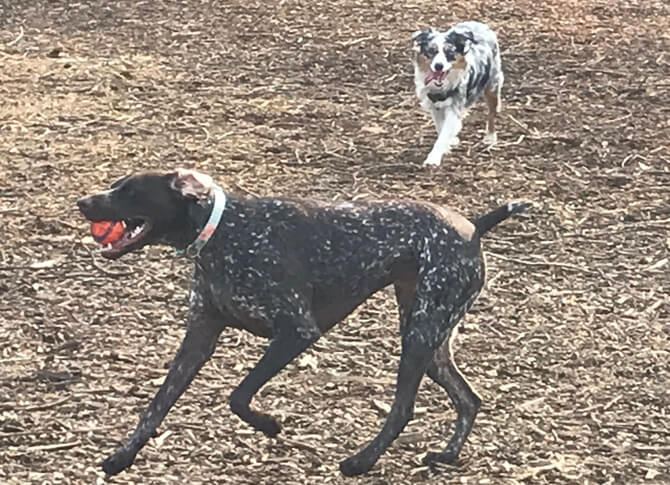
The durability factor of the ChuckIt! Ultra Ball stood out to us. Not only does it have an indestructible design made especially for aggressive chewers, but its high-visibility and colorful design nailed it in our list of indestructible criteria.
The tough natural rubber core and sturdy walls of the ball allow it to be very bouncy which attracts your dogs’ attention, encourages them to jump as high as they could, and engages them to play for hours. Although the ball has a thick textured surface, it is also soft on your dog’s teeth and mouth.
The lightweight and buoyant nature of the ball allows it to float in water. Have your dog jump into the water and fetch the ball!
Additionally, the bright colors of the ball allow you to play fetch at any time of the day for as many hours as you like. Best of all, it’s a great way to bond with your canine companion and have fun.
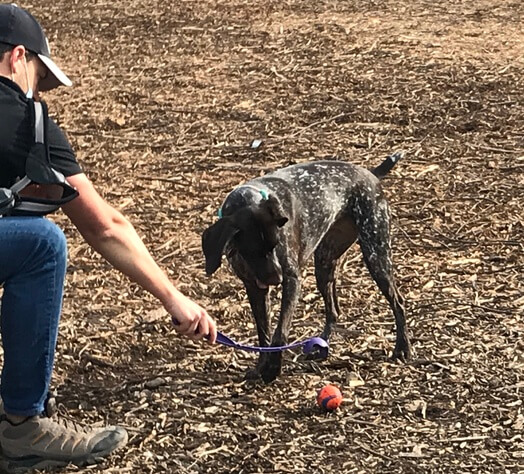
ChuckIt! Ultra Ball Key Features:
- High-impact bouncing entices dogs to play fetch
- Lightweight and buoyant design that will float in water
- Compatible with Chuckit! ball launcher
- Rubber ball has a textured surface with a thick rubber construction for aggressive chewers yet soft on the dog’s mouths
- Bright colors allow owners and canine to play at any time of the day and stay engaged
- Easy to wash
- Available in 3 sizes: Medium, X-Large, and XX-Large
Price: Range from $4 to $13 depending on the size of the ultra ball
What customers are saying:
Pros
- An overwhelming number of dog owners said this is the ball to get for your dogs if they are aggressive chewers.
- Pitbulls owners said their dogs yet to destroy the ball. They said these are must-have for any type of dog. They recommend this ball for destructive dogs.
- Many owners noted that their dogs are obsessed with the ChuckIt! Ultra Ball. In fact, they chew on it like it’s a pacifier, yet the ball stays perfectly fine.
- Dog owners love that the ball is easy to throw, bounces great, floats in water, and is super easy to wash off. Best of all, they love the durability of the ball.
- Some owners said to get the Chuckit! ball launcher because it keeps their hands clean, while their dogs get a good workout. The launcher is also great for kids who like to play fetch with the dogs because it keeps their little hands safe.
Cons
- A few customers advised buying the right size ball for your dogs. For example, if you have a large dog, make sure to get a large or extra-large ball and not a medium or small ball. Other than that, have fun!
In conclusion, while a muzzle can limit a dog’s ability to bark, it does not address the root cause of the barking. As responsible dog owners, it’s our role to understand the motivations behind our dog’s barking and seek to address them in humane, effective ways.
Muzzles are tools that can be used in specific scenarios but should not be relied on as a primary solution to manage barking.
DISCLAIMER: THIS WEBSITE DOES NOT PROVIDE MEDICAL ADVICE
The information, including but not limited to, text, graphics, images and other material contained on this website are for informational purposes only. No material on this site is intended to be a substitute for professional veterinary advice, diagnosis, or treatment. Always seek the advice of your veterinarian or other qualified health care provider with any questions you may have regarding a medical condition.

With over five years of specialized experience as an animal writer, my expertise lies in dog nutrition, health, behavior, grooming, and training. I am dedicated to delivering helpful and informative content that caters to the well-being of our furry friends. My primary goal is to empower pet owners with knowledge and ensure our canine companions thrive in health and happiness. In my free time, I love volunteering at local dog rescue centers.



